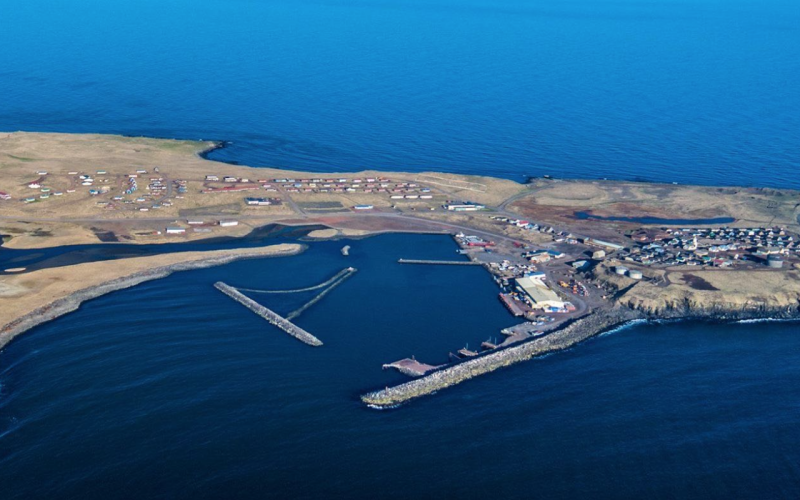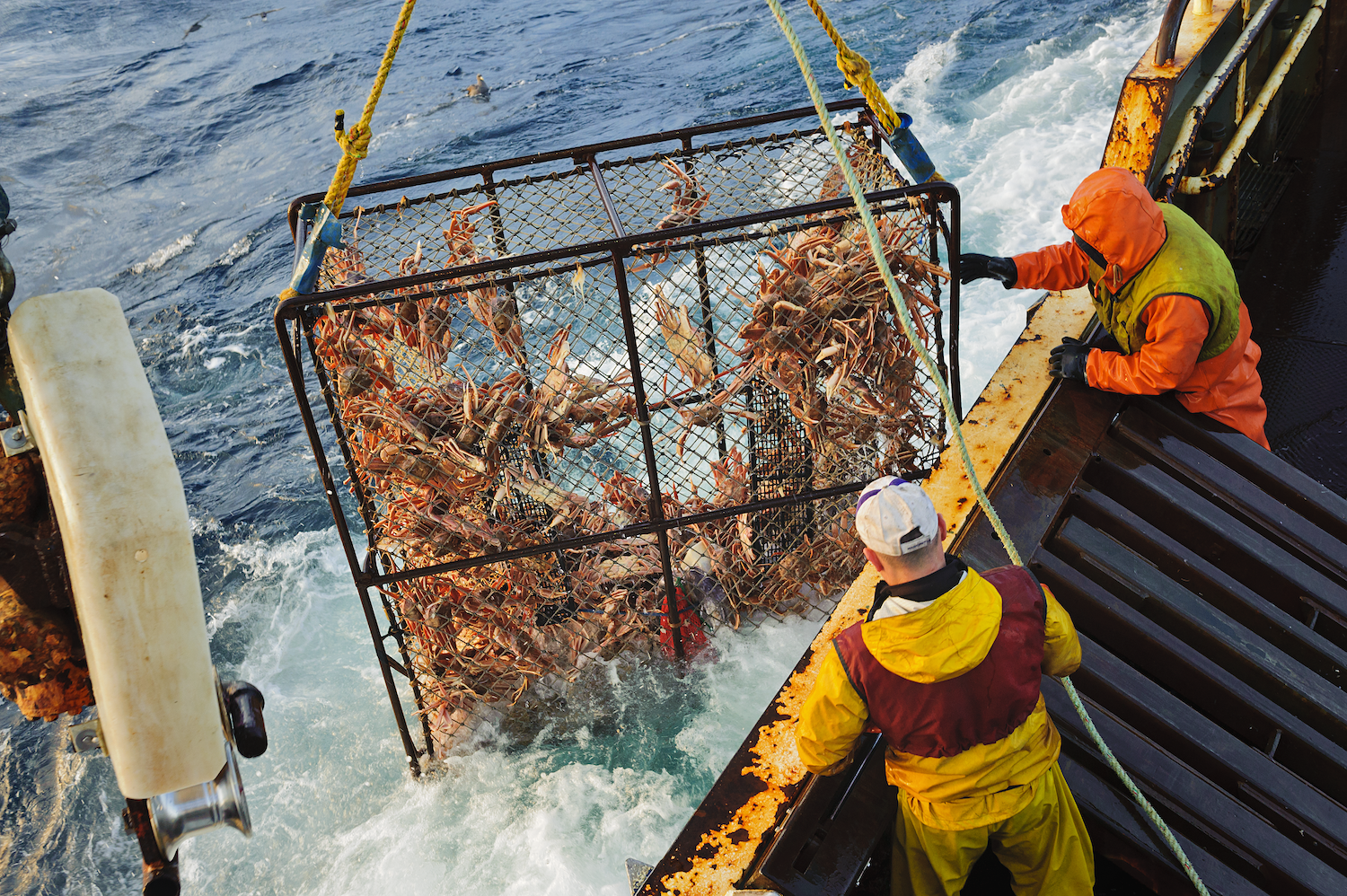With a virtually complete shutdown of Bering Sea crab fishing at hand, fishermen, and Alaska communities are seeking an expedited fishery disaster declaration from the federal government.
The emergency is felt acutely on St. Paul Island, where the largely Aleut community of about 400 live on an economy dependent on the now-closing snow crab fishery.
“We’re predicting a 90 percent loss from two years ago and 85 percent of revenue from last year, said Ray Melovidov, chief operating officer of the Central Bering Sea Fishermen’s Association based in St. Paul.
Other revenue streams come in from pollock and cod fishing, but crabbing carries the freight for St. Paul. The money pays for fully funded preschool programs, home heating aid for residents, and community-wide broadband internet access among others said Melovidov, who serves on the city council.
Revenue from the big boats help maintain a local halibut fleet of 15 boats and about 80 crewmembers, a subsidy to buy their catch at prices competitive with other ports, said Melovidov.
St. Paul and other fishing communities reeled with the Oct. 10 announcement from the Alaska Department of Fish and Game that the 2022-2023 crab seasons would close after grim survey results.
An Oct. 18 letter to Alaska Gov. Mike Dunleavy, from Alaska Bering Sea Crabbers and other industry and community advocates, made the case for a U.S. Department of Commerce disaster finding. The new request should be tagged onto an existing plea for the Bristol Bay red king crab fishery season of 2021-2022, the advocates say.
“Because the 2022/2023 Bristol Bay red king crab and Bering Sea snow crab fisheries are a complete closure and there is no final data to wait on for a determination, we ask that the Governor request that the Secretary of Commerce expedite the decision on these fisheries plus the 2021/2022 Bristol Bay red king crab request from last year,” the letter states. “Combined, these fisheries total a loss in ex-vessel value of approximately $202 million.”
Total revenue losses are estimated at 100 percent for the closure of both Bristol Bay red king crab and for Bering Sea snow crab from 2022/2023, totaling an estimated $151 million in lost ex-vessel value, according to the request. More recent data, paired with pending 2021/2022 Bristol Bay red king crab, bring estimated losses to a total $202 million, the letter states.
“The Bering Sea snow crab fishery was closed for the first time in U.S. history of the fishery with this year’s 2022/2023 crab fishing season,” the letter says. “And last year, the snow crab total allowable catch (TAC) was unexpectedly reduced by 88 percent from the previous year. It is clear this fishery will meet the threshold for a disaster due to the complete closure this year.”
In a joint statement, St. Paul city and fishing business leaders lay out the peril facing theirs and other communities.

“Saint Paul Island’s economy is approximately 90 percdnt dependent on the snow crab fishery. The activities associated with the harvesting and delivery of crab to the Trident Seafoods shore-side plant for processing is the primary source of municipal taxes and local revenues, underpins other fishery and business activities such as the local halibut fishery, and sustains the harbor and other fisheries-related infrastructure built on the island at considerable federal, state, and local expense since the phase-out of the commercial fur seal harvest in 1984.
“To make matters worse, the BBRKC (Bristol Bay red king crab) fishery – a portion of which is delivered and processed on Saint Paul Island in the fall months – will remain closed for a second year in a row.”
In an average year, the City of St. Paul collects about $2.7 million in fisheries taxes. With the shutdown, it’s anticipated only $200,000 will come in.
“Without the taxes derived from crab processing our municipal government will struggle to support essential municipal services such as public safety, road maintenance, and emergency medical services,” said Saint Paul Island Mayor Jacob Merculief. “We may need to cut municipal staff.”
The non-profit Central Bering Sea Fishermen’s Association is the local Community Development Quota (CDQ) group for Saint Paul Island. The association is allocated 20 percent of the total Bering Sea snow crab that is set aside for the CDQ program. The non-profit entity is one of the six groups that together make up the CDQ program, established in 1992 by federal statute to manage Bering Sea fisheries assets to promote social and economic development in the communities they serve.
“In addition to harvesting CDQ allocations on its two crab vessels, CBSFA has made substantial additional investments in crab assets, both processing and harvesting shares in the rationalized crab management program in the Bering Sea, and is highly dependent on revenues from snow crab, Bristol Bay red king crab and other crab species,” according to the statement.
The Central Bering group had already sold one of three crab boats last year amid the ongoing stock decline, and managed careful use of its savings through the 2021-2022 season.
“We’ve done successfully in the past year. Our budget was pretty tight going into 2022,” said Melovidov. With money in the bank, there is some flexibility for the short term.
The prospect of hardship is alarming but St. Paul can pull through, local advocates say.
“I love St. Paul and want to spend my whole life here,” said Melovidov, who has two young children, “and hope there is a future for them here.”
Despite the crab stocks situation, there is opportunity and ways to diversify too, he says.
“We’re in the middle of the richest commercial fisheries in the world,” said Melovidov. Work to build more fishing infrastructure – and assistance from regulators on wastewater requirements for fish processing – could add to the community’s economic base, he said.
“God has given us a privileged location amidst some of the richest commercial fisheries in the world,” said Mayor Merculief. “We are a resilient community and have been through crises before. With some help, I hope that my people will be able to continue making a living from the resources of the Bering Sea as we have done for thousands of years.”
The community statement echoes the Alaska Bering Sea Crabbers Association position that the North Pacific Fishery Management Council and other federal and state authorities must do more, specifically in protecting crab habitat and reducing bycatch from other fisheries.
“Managers and scientists must further identify and protect the centers of crab abundance, and support meaningful rebuilding measures such as habitat protections for king crab. Stakeholders have advocated for Council consideration of management that specifically protects molting and mating crab from fishing impacts adjusts the minimum bycatch limit at low snow crab abundance, and estimates unobserved fishing mortality using best available information.”







